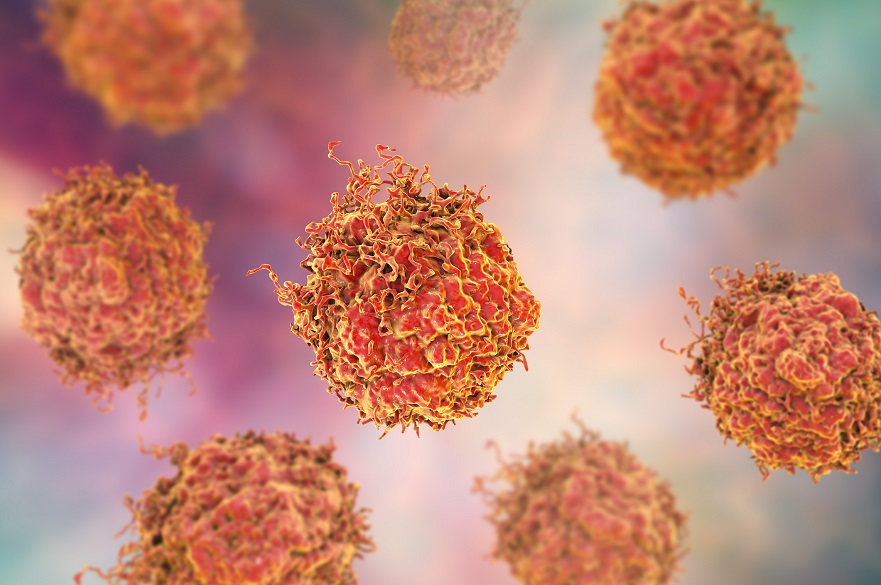Mutant enzyme helps prostate cancer to spread and become more aggressive
Scientists have identified how a specific enzyme plays a key role in enabling prostate cancer to become more aggressive and harder to treat.

A team at Nottingham Trent University has found that ‘transglutaminase 2’ (TG2) which is abundant in many of the body’s cells, is responsible for driving a process which leads to the progression and spreading of prostate cancer.
Early prostate cancer cells require the male hormone androgen to grow but as they advance they can become androgen-independent and therefore harder to treat with current therapies.
Until now it has not been clear how that process occurs but following tests the team found that a mutant form of TG2 is overproduced in prostate cancer and remains trapped inside the nucleus of cells.
There it restricts the levels of androgen response – making cancer cells the more aggressive androgen-independent – and increases expression of the protein ‘mucin-1’, which is known to be responsible for the growth and spreading of cancer.
The study also found that mucin-1 forms a mucous barrier on cell surfaces which protects cancer cells.
To support the work further the researchers analysed biopsies of prostate cancer patients and identified increased levels of TG2.
While it can play a protective role in the body, TG2 has been associated with various human diseases, including neurodegenerative diseases such as dementia and organ fibrosis.
The team proposes that controlling the activity of the TG2 enzyme and mucin-1 may offer a new therapeutic option to treating aggressive prostate cancer.
In the UK prostate cancer is the most common cancer in men, with more than 52,000 diagnosed every year.
“We wanted to explore why some cancer cells become androgen-independent and as a result more aggressive and harder to treat,” said lead scientist Dr Elisabetta Verderio Edwards, from Nottingham Trent University’s School of Science and Technology.
She said: “Transglutaminase is a multifunctional protein in all tissues and is involved in multiple processes. We have now deepened our understanding of its key role in aggressive disease in prostate cancer patients.
“Understanding this pathway is incredibly important. This process plays a key role in cancer’s ability to evade treatment and so warrants further investigation in terms of potential future treatment and therapy.”
Dr Adeola Atobatele, another scientist on the study, said: “This finding has opened a significant pathway for understanding other key mechanisms prostate cancer cells utilise to evade key regulatory pathways.”
Last year NTU researchers revealed how tiny ‘nano-shuttles’ transported TG2 around the brain where it went on to play a role in the activity of neurons.
The latest study, which also involved the Polyclinic Hospital University (University of Messina) in Italy, is published in the journal Cell Death and Disease.
-
Notes for editors
Press enquiries please contact Dave Rogers, Public Relations Manager, on telephone +44 (0)115 848 8782, or via email.
Nottingham Trent University (NTU) received the Queen’s Anniversary Prize for Higher and Further Education in 2021 for cultural heritage science research. It is the second time that NTU has been bestowed the honour of receiving a Queen’s Anniversary Prize for its research, the first being in 2015 for leading-edge research on the safety and security of global citizens.
The Research Excellence Framework (2021) classed 83% of NTU’s research activity as either world-leading or internationally excellent. 86% of NTU’s research impact was assessed to be either world-leading or internationally excellent.
NTU was awarded The Times and The Sunday Times Modern University of the Year 2023 and ranked University of the Year in the Whatuni Student Choice Awards 2023. It was awarded Outstanding Support for Students 2020 (Times Higher Education Awards), University of the Year 2019 (Guardian University Awards, UK Social Mobility Awards), Modern University of the Year 2018 (Times and Sunday Times Good University Guide) and University of the Year 2017 (Times Higher Education Awards).
NTU is the 5th largest UK institution by student numbers, with approximately 40,000 students and more than 4,400 staff located across five campuses. It has an international student population of 7,000 and an NTU community representing over 160 countries.
Since 2000, NTU has invested £570 million in tools, technology, buildings and facilities.
NTU is in the UK’s top 10 for number of applications and ranked first for accepted offers (2021 UCAS UG acceptance data). It is also among the UK’s top five recruiters of students from disadvantaged backgrounds and was the first UK university to sign the Social Mobility Pledge.
NTU is ranked the second most sustainable university in the world in the 2022 UI Green Metric University World Rankings (out of more than 900 participating universities).
- Subject area: Sciences including sport sciences
- Category: Press office; Research; School of Science and Technology


